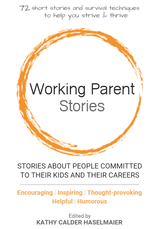|
Insights from Lucas Casarez, Certified Financail Planner ™ It's not unusual to hear a working parent lament the high cost of childcare, and some even consider quitting their jobs to care for their children full-time explaining that "It doesn't make sense for me to work if all my money goes for daycare." But that's probably not true; even if the cost of daycare is equivalent to 50% of your family's take-home pay, it's short-sighted to opt out of the workforce for even a few years if you consider the situation from a purely financial perspective. If you're looking for a reason to quit your job, and want to blame it on your paycheck, this story isn't for you. Consider the Big Picture Even if 50% of your family's take-home pay is needed to cover the cost of childcare, don't forget that your job probably provides other compensation; things like social security contributions, 401(k) contributions and possibly matches, insurance benefits, stock purchase benefits, and training, not to mention the fact that you're increasing your experience and theoretically becoming more valuable and employable every year. If you opt out of the job market for a few years, you may also miss out on pay increases and possible promotions. Long-term Impact (It may be greater than you think) Here's one, overly simplified, example. Assume that a working parent earns* $50K/year, contributes to a 401(k) plan, receives a 3% 401(k) employer match, and receives 3% pay increases each year. A quick (and incomplete) calculation may lead you to think that a decision to take a five year "break" from work would "cost" $250K (i.e. $50K/year x 5 years). But given the time value of money, plus the cost in terms of lost salary increases and benefits, the actual cost, by the end of a 35-year career, is more like $664K. And maybe that's OK. But if it's not, be sure you're doing the big picture math! Chances are that each year you spend away from your job will reduce your earnings (and savings) for the rest of your career. When you consider the cost of taking a break from your career, be sure to do the math and take the long-term view. * For the sake of simplicity we've ignored taxes, all non-401(k) benefits (e.g. health and other insurance assistance, stock savings plans, bonuses and/or profit sharing, educational benefits, and professional training, and promotions). If you receive these benefits, a career break will cost you even more.
Related story:
0 Comments
Leave a Reply. |
The StoriesArchives
March 2022
Categories
All
|
Photos from barnimages.com, marcoverch, truewonder, donnierayjones, marcoverch, shixart1985, Gustavo Devito, edenpictures, nan palmero, quapan, The Pumpkin Theory, bark, opassande, Semtrio, Ivan Radic (CC BY 2.0), verchmarco (CC BY 2.0), Didriks, shawnzrossi, shixart1985 (CC BY 2.0), madprime, marksmorton, CT Arzneimittel GmbH, NwongPR, franchiseopportunitiesphotos, anotherlunch.com, jdlasica, wuestenigel, Frinthy, romanboed, Doris Tichelaar, quinn.anya, A_Peach, VisitLakeland, MEDION Pressestelle, Darren Wilkinson, bratislavskysamospravnykraj, Anthony Quintano, Danielle Scott, pockethifi, Bridgette Rehg, Martin Pettitt, PersonalCreations.com, wuestenigel, Thad Zajdowicz, archer10 (Dennis) 139M Views, Infomastern, beltz6, The National Guard, futurestreet, daveynin, OIST (Okinawa Institute of Science and Technology), Rinet IT, shixart1985, mikecogh, JeepersMedia, Ryan Polei | www.ryanpolei.com, Jake.Christopher., aleksandrajovovich, thepeachpeddler, wwward0, flossyflotsam, Got Credit, Senado Federal, Corvair Owner, lookcatalog, moodboardphotography, dejankrsmanovic, Carine fel, ElleFlorio, {Guerrilla Futures | Jason Tester}, greg westfall., Arlington County, mariaronnaluna, quinn.anya, wuestenigel, Tayloright, insatiablemunch, MrJamesBaker, Scorius, Alan Light, Monkey Mash Button, www.audio-luci-store.it, wohlford, Vivian Chen [陳培雯], okchomeseller, BoldContent, Ivan Radic, verchmarco, donnierayjones, Czar Hey, US Department of Education, Andrew Milligan Sumo, Michel Curi, anotherlunch.com, ProFlowers.com, Cultural viewpoints from around the world, alubavin, yourbestdigs, Rod Waddington, Tayloright, Wonder woman0731, yourbestdigs, donald judge, Thomas Leth-Olsen, Infinity Studio, shixart1985, wuestenigel, francesbean, Roger Blackwell, MrJamesBaker, Luca Nebuloni, MFer Photography, erinw519, boellstiftung, North Carolina National Guard, A m o r e Caterina, MrJamesBaker, bellaellaboutique, Free For Commercial Use (FFC), Prayitno / Thank you for (12 millions +) view, wuestenigel, Matt From London, MadFishDigital, Kompentenzzentrum Frau und Beruf, mikecogh, CreditDebitPro, marciadotcom, Mr.Sai, _steffen




 RSS Feed
RSS Feed